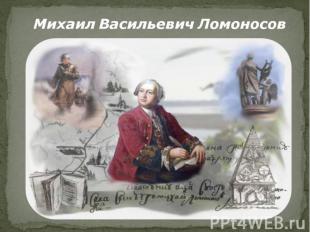Презентация на тему: The students' conference is dedicated to the third centenary since his birth.


THE PROGRAMME M. V. Lomonosov’s biography. (Rapasova Kristina. Form 7) Lomonosov – the first historian of the Russian people. (Briginets Sofia. Form 8a)

Lomonosov and the art. (Dyadkina Elena. Form 8B) Lomonosov and Russian language. (Rodchenkova Anna. Form 8A) Lomonosov’s wishes to descendants. (Nekipelova Yanita. Form 7)


Mikhail Vasilievich Lomonosov M. V. Lomonosov, is known as the father of Russian science, an outstanding poet, founder of Russian literature and creator of the Russian language.

Lomonosov was born on the 19th of November, 1711 in a fisherman’s family, near Kholmogory in the village of Denisovka (later renamed Lomonosovo in his honor) in the Arkhangelsk Governorate. Lomonosov was born on the 19th of November, 1711 in a fisherman’s family, near Kholmogory in the village of Denisovka (later renamed Lomonosovo in his honor) in the Arkhangelsk Governorate.

Learning was young Lomonosov's passion. At an early age Mikhail learned to read and write through church books. When he was fourteen, Lomonosov was given copies of Meletius Smotrytsky’s “ Modern Church Slavonic” (a grammar book) and Leonty Magnitsky’s “Arthimetic.” Learning was young Lomonosov's passion. At an early age Mikhail learned to read and write through church books. When he was fourteen, Lomonosov was given copies of Meletius Smotrytsky’s “ Modern Church Slavonic” (a grammar book) and Leonty Magnitsky’s “Arthimetic.”

When he was 19, Lomonosov went on foot to Moscow where he entered the Slavic Greek Latin Academy. The Academy was closed to peasants and Lomonosov had to hide his peasant origin. He pretended to be of noble birth. When he was 19, Lomonosov went on foot to Moscow where he entered the Slavic Greek Latin Academy. The Academy was closed to peasants and Lomonosov had to hide his peasant origin. He pretended to be of noble birth.

Here he studied Latin and mastered it in a short period of time. At that time he was hard up, for his only income was a stipend of three kopecks a day but he made rapid progress scholastically. He completed a twelve-year study course in only five years, graduating at the top of his class. Here he studied Latin and mastered it in a short period of time. At that time he was hard up, for his only income was a stipend of three kopecks a day but he made rapid progress scholastically. He completed a twelve-year study course in only five years, graduating at the top of his class.

He was a brilliant pupil and in 1736 he was sent abroad at the University of Marburg. While abroad Lomonosov studied philosophy, physics, mathematics and foreign languages and even began writing poetry. He also developed an interest in German literature. He was a brilliant pupil and in 1736 he was sent abroad at the University of Marburg. While abroad Lomonosov studied philosophy, physics, mathematics and foreign languages and even began writing poetry. He also developed an interest in German literature.

He was a brilliant pupil and in 1736 he was sent abroad at the University of Marburg. While abroad Lomonosov studied philosophy, physics, mathematics and foreign languages and even began writing poetry. He also developed an interest in German literature. He was a brilliant pupil and in 1736 he was sent abroad at the University of Marburg. While abroad Lomonosov studied philosophy, physics, mathematics and foreign languages and even began writing poetry. He also developed an interest in German literature.

Lomonosov strove to upgrade the quality of Russian science and education. He founded Moscow State University in 1755. This university, officially named after Lomonosov, is at the apex of the Russian system of higher education. Lomonosov strove to upgrade the quality of Russian science and education. He founded Moscow State University in 1755. This university, officially named after Lomonosov, is at the apex of the Russian system of higher education.

Pushkin said about Lomonosov : Pushkin said about Lomonosov : « Lomonosov was a great man…. He founded the first Russian university: or to express it more correctly he himself was our first university».

M.V.Lomonosov made many important discoveries in different fields of science: physics, chemistry, astronomy. The last period of Lomonosov’s activity was connected with his scientific investigation in navigation. He tried to find a short sea route from the West to the East through the Arctic Ocean. In this field as well he was ahead of his age. M.V.Lomonosov made many important discoveries in different fields of science: physics, chemistry, astronomy. The last period of Lomonosov’s activity was connected with his scientific investigation in navigation. He tried to find a short sea route from the West to the East through the Arctic Ocean. In this field as well he was ahead of his age.

His literary works remain one of the most significant pages of Russian literature in the 18 th century. He wrote verses, odes and poems. He also laid the basis for the scientific study of the Russian language, he wrote the first Russian grammar.

Russian critic Belinsky wrote of Lomonosov: «Our literature begins with Lomonosov; he was its father and mother, he was its Peter the Great ». Russian critic Belinsky wrote of Lomonosov: «Our literature begins with Lomonosov; he was its father and mother, he was its Peter the Great ».

At the end of his life in 1764 Lomonosov was elected honorary member of the Stockholm and Bologna Academies. At the end of his life in 1764 Lomonosov was elected honorary member of the Stockholm and Bologna Academies.

In 1765 Lomonosov caught a cold and died on the 15th of April, 1765 at age 54. He is buried in the cemetery of Alexander Nevsky Monastery in St. Petersburg . In 1765 Lomonosov caught a cold and died on the 15th of April, 1765 at age 54. He is buried in the cemetery of Alexander Nevsky Monastery in St. Petersburg .

Lomonosov is widely known and honoured in our country. He occupies a central place in the history of Russian science. The Russian Academy of Sciences awards Lomonosov honorary medals in scientific achievement - one to a Russian and one to a foreign scientist. Lomonosov is widely known and honoured in our country. He occupies a central place in the history of Russian science. The Russian Academy of Sciences awards Lomonosov honorary medals in scientific achievement - one to a Russian and one to a foreign scientist.

Lomonosov is memorialized in many place names - Moscow University was named after its founder and monuments to him have been erected in Moscow, St Petersburg , Arkhangelsk , Severodvinsk , the village of Lomonosovo and Koryazhma. Lomonosov is memorialized in many place names - Moscow University was named after its founder and monuments to him have been erected in Moscow, St Petersburg , Arkhangelsk , Severodvinsk , the village of Lomonosovo and Koryazhma.

In 1957 the name of Lomonosov was given to the Arkhangelsk State Pedagogical Institute, now the Pomor State University named after M. V. Lomonosov. In 1957 the name of Lomonosov was given to the Arkhangelsk State Pedagogical Institute, now the Pomor State University named after M. V. Lomonosov.

The theatre, the town library and an avenue in Arkhangelsk bear Lomonosov’s name. The theatre, the town library and an avenue in Arkhangelsk bear Lomonosov’s name.

His name is also found on the map of the world: a stream in the Atlantic Ocean, mountain ranges of Novaya Zemlya and Spitsbergen, a plateau in Greenland, an underwater mountain in the Arctic Ocean and even a crater on the Moon were named after the great scientist. They commemorate his achievements in Geography , Oceanography and mapping. His name is also found on the map of the world: a stream in the Atlantic Ocean, mountain ranges of Novaya Zemlya and Spitsbergen, a plateau in Greenland, an underwater mountain in the Arctic Ocean and even a crater on the Moon were named after the great scientist. They commemorate his achievements in Geography , Oceanography and mapping.

Every year scientific Lomonosov Readings are held in Arkhangelsk. Scholars from the best-known research centers of the country come to take part in them. Every year scientific Lomonosov Readings are held in Arkhangelsk. Scholars from the best-known research centers of the country come to take part in them.

Lomonosov – the first historian of the Russian people

We shall never be able to tell exactly what made the great scientist get interested in the history of Russia and its peoples from ages ago. We can only suppose… This interest must have came to him in his young years.



Lomonosov’s interest in history deepened when in March 1748 the Historical Assembly was opened at the Academy. Being appointed to the department, Lomonosov soon played a leading role in it: reviewed the works, took part in discussions and expressed his competent opinion. Lomonosov’s interest in history deepened when in March 1748 the Historical Assembly was opened at the Academy. Being appointed to the department, Lomonosov soon played a leading role in it: reviewed the works, took part in discussions and expressed his competent opinion.

One should be astonished by the far-sightedness of the great Russian thinker. It seems he lived only recently.

His thoughts seem to be in tune with problems of today! This is the power of a genius ,having the deep patriotism and love for his homeland.

Lomonosov and the art








The active love to his people, hot patriotism made Lomonosov to carry out more than four thousand experiments to create the monumental mosaics “ For preservation of the heroic glorious deeds that debt to the Motherland ordered to represent”. Lomonosov is a unique example of the depth of scientific and art enlightenment.

Lomonosov and Russian language







So, Lomonosov theoretically and practically favoured the development of Russian language and its study. Main thing what Lomonosov brilliantly managed is to arouse huge interest of the public to language. So, Lomonosov theoretically and practically favoured the development of Russian language and its study. Main thing what Lomonosov brilliantly managed is to arouse huge interest of the public to language. That’s why the Russian literary language with its style’s richness develops so quickly after Lomonosov, many genres of poetry and prose form different aspects of oratory, philology becomes more active, Russian language vocabularies and Russian grammar are set up.

Lomonosov’s wishes to descendants

PATRIOTISM

Demography

EDUCATION

SCIENCE, ENLIGHTENMENT “Science is a clear knowledge of truth, enlightenment of intellect, praise of the young, support of the old, builder of cities, strength of luck in misery, adorning in happiness, reliable partner everywhere. Intellect by means of science gets to the mystery of substance, points out where is a truth. Science and experience are only means, only a framework for reflection”.







































































